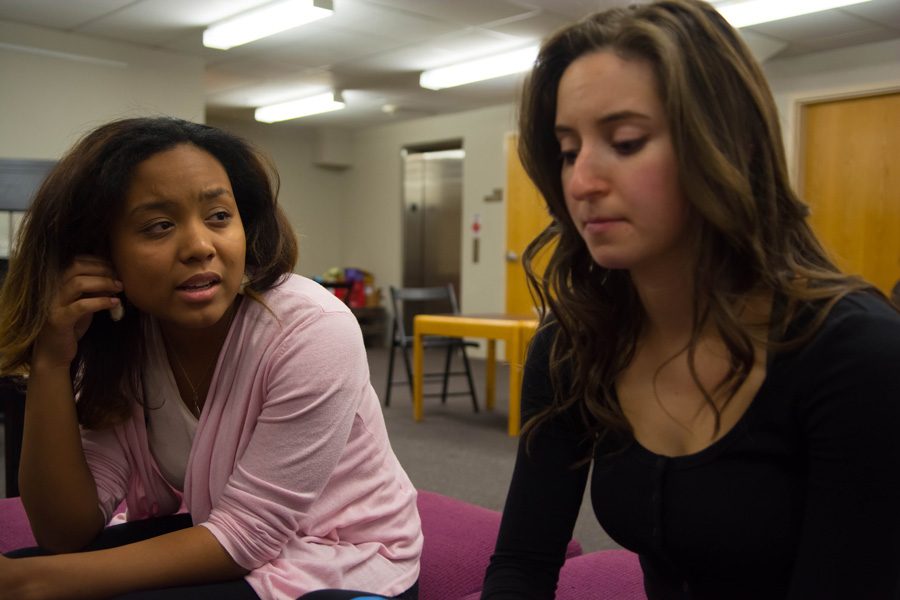‘Stunning’ explores the intersection of religion, race, sexuality
Katie Pach/The Daily Northwestern
Students rehearse for the upcoming play “Stunning,” which will run from May 26 to May 28 in Shanley Pavilion. The play explores a variety of themes including sexuality and ethnicity.
May 26, 2016
A&E
When Meryl Crock and Jenna Levin searched for plays to produce, they said they wanted to find a show that would explore themes ranging from sexuality to ethnicity to self-determination.
While considering more than 40 plays, they found what they were looking for in “Stunning.”
“It was encompassing all of the different things that we wanted to talk about,” said Crock, a Communication sophomore and the play’s producer. “Representation of race on stage, representation of women characters on stage and all with this through line of faith-based theater and so it just was this crazy combination of everything that we were looking for.”
“Stunning,” which is Jewish Theatre Ensemble’s spring play, focuses on Lily, a 16-year-old girl from a Syrian-Jewish community in Brooklyn, who marries a much older man but later enters into a romantic relationship with her black female live-in maid. The play by David Adjmi, will run Thursday through Saturday at Shanley Pavilion.
Crock and Levin said they were adamant about selecting a female-driven production that showcased strong women and intersectional themes like race and sexuality.
Crock said Lily grows up believing that women and men were supposed to be together, but when she meets Blanche, her maid, she realizes “that’s not how love works.”
Characters also grapple with questions of identity and assimilation, Levin said, as people in the play identify as white American Jews even though they are Syrian.
“It’s about being white, adapting to the American dream like a lot of other groups,” said the Communication junior, who is the play’s director. “Especially for the men, becoming white men, (and) very much casting off their Syrian heritage and really subscribing to the ideals of materialism and working hard and being a business mogul and having a nice house.”
Because characters in the play can range from Syrian to black, Crock and Levin said there were challenges when it came to casting and making sure actors could do the diverse characters justice.
Another challenge came from trying to strike a balance between navigating the different themes in the production, while making the story feel real, Levin said. She added that it’s important to explore topics like “queer politics,” but she also wanted people to relate to the characters and be invested in the love story between Lily and Blanche.
One of the more surreal elements of the production is its design, Levin said, where the set resembles a fish bowl.
“It’s this fake, constructed world that’s really beautiful … but it’s all fake and it’s encased in glass so you feel trapped,” Levin added. “(You) can look out, people can look in, and that’s it. It’s just about what it means to live in a community where it’s all about being looked at (and) things being fake or materialistic.”
Hayley Himmelman, who plays Lily, said she was drawn to “Stunning” because she wanted to work with Crock and Levin, who she described as “boss ladies,” and could relate to Lily’s experiences and personal growth.
“She’s really impressionable and I think that’s true for me as well,” the Communication senior said. “That’s something I’ve learned especially in college, is to take everything with a grain of salt, figure out who I really trust … and not just believe everything that everyone else is telling me. It’s me trying to grow out of my naivete and Lily does that as well.”
As for a moral in the play, Levin said it’s more important to ask questions than answer them. Instead, she hopes it will incite discussion about the “gray spaces” in topics like gender, sexuality, religion and ethnicity.
She also said the themes explored in the play are not limited to Jewish identity, but everyone, especially college students, can relate to the questions it poses throughout.
“College is the first time in our lives where we’re away from our families, we’re away from the traditions we grew up with,” Levin said. “It’s about, ‘OK, I’m away from what I grew up with, what do I want to keep? What do I want to completely run away from? What do I want to cast off that I can’t because it’s just a part of me at this point?’”
Email: [email protected]
Twitter: @_rachelyang


